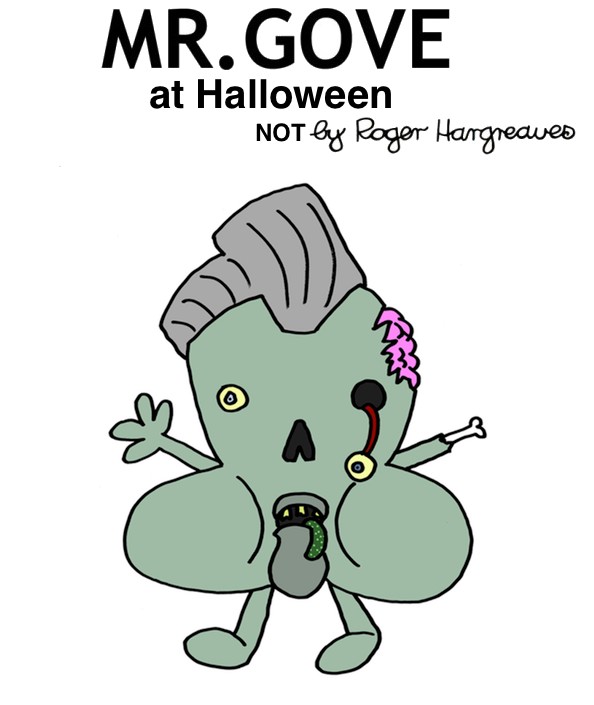Mr Gove wasn’t sure he really liked Halloween.
The idea of ‘trick or treat’ went against the grain: he didn’t really approve of treats.
All these parties seemed frivolous. Pointless. Mr Gove didn’t really like seeing people have fun. Particularly not children.
So when the invitation came to the Cabinet Halloween Party, Mr Gove was a little confused. Unlike some of his colleagues, however, Mr Gove knew about Loyalty, so if Mr Cameron asked him to go to a party, Mr Gove would go to the party.
Mr Gove didn’t really like costumes either, but one of his advisors told him he must, and dressed him up as what he told Mr Gove was a zombie. When one has a job to do, one must make sacrifices, Mr Gove thought. He quite liked sacrifices. Particularly when other people had to make them, like the children that had been sacrificed for his Brilliant Idea of schools without qualified teachers.
The party seemed quite dull to start with, but Mr Gove had to admit that some of the costumes were good. Mr Failinggrayling made an excellent Frankenstein’s monster, looming high over everyone else, and looking down his nose at them. Mr Failinggrayling had always been good at looking down his nose. Mr Gideon didn’t even really need the teeth to get that vampire look. Mr Paterson’s werewolf, with bits of dead badger hanging from his mouth, was just the thing. Only Mrs May seemed to let the side down: her witch with a Rebekah Brooks wig seemed in exceptionally bad taste.
After a little while, Mr Cameron called everyone together.
‘We have a problem,’ Mr Cameron told them all. ‘We’re not scary enough.’
Mr Gove looked around the room. He looked at the vampires, zombies, werewolves, ghosts and witches, and he wondered if, just this once, Mr Cameron might be right. Not that scary at all.
‘I tried to scare those horrible traitors at the Guardian into stopping telling our secrets,’ Mr Cameron went on, ‘but they just ignored me.’
‘You may be right, Mr Cameron,’ whined Mrs May plaintively. ‘My lovely vans only managed to scare a single one of those nasty illegal immigrants into going home.’
Was that what they were supposed to do? Mr Gove wasn’t sure at all. He had thought they were supposed to make other people scared of everyone who even looked like an immigrant – and they seemed to do that job rather well.
‘I did manage to scare those lefties at the BBC,’ Mr Shapps said, or was it Mr Green, or Mr Fox? Mr Gove was never quite sure. Either way, Mr Shapps-Green-Fox was being silly. The BBC was always scared. Everyone knew that. But Mr Shapps-Green-Fox was always silly.
‘I tried to scare those people in Lewisham,’ Mr Hunt moaned, ‘but they weren’t scared enough. They kept on going to court, and they kept on winning.’
‘But,’ piped up Little Mr Clegg, ‘do we really have to be scary? I thought we could be nice to people.’ Mr Gove gave Little Mr Clegg a withering look. Little Mr Clegg sat back down, and looked as though he was about to cry.
‘You see the problem,’ Mr Cameron said. ‘We’re not nearly scary enough. Even Mr Miliband doesn’t seem scared any more. That’s not good.’
And then Mr Quiet rose quietly to his feet. Mr Gove realised that Mr Quiet didn’t have a Halloween costume on – but somehow he was the scariest person in the room.
‘I think,’ said Mr Quiet, in his quiet and dangerous voice, ‘I know how to be scary. I have been working on it for some time. Many people are very scared of me.’
Mr Gove looked around the room again. Mr Quiet was right. Quite a lot of the people in the room seemed to be afraid of Mr Quiet. They must have been. How else would someone as bad at his job as Mr Quiet still be in the cabinet?
‘In fact,’ Mr Quiet went on, in an even quieter voice, ‘I have scared some people so much that they have died.’
For a while there was silence. No-one wanted to speak at all. Not even Mr Shapps-Green-Fox, and it was usually almost impossible to stop him speaking.
Eventually Mr Cameron spoke again. ‘So there you have it. We have less than two years. We must be scarier. Much scarier.
Mr Gove smiled. This was the kind of plan that he liked.
Words by me, art by @kaiserofcrisps
The other stories in the Mr Gove series can be found here:













